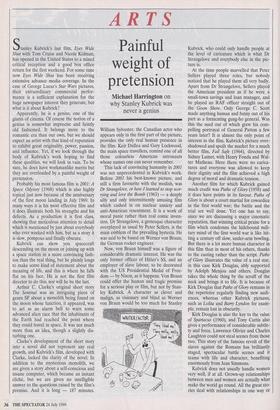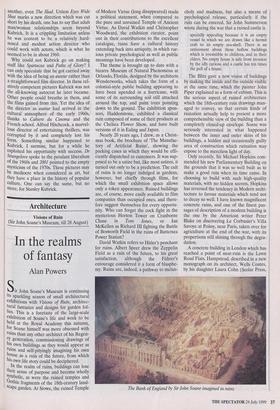ARTS
Painful weight of pretension
Michael Harrington on why Stanley Kubrick was never a genius Stanley Kubrick's last film, Eyes Wide Shut with Tom Cruise and Nicole Kidman, has opened in the United States to a mixed critical reception and a good box office return for the first weekend. For some time now Eyes Wide Shut has been receiving extensive advance media coverage. In the case of George Lucas's Star Wars pictures, their extraordinary commercial perfor- mance is a sufficient explanation for the huge newspaper interest they generate, but what is it about Kubrick?
Apparently, he is a genius, one of the giants of cinema. Of course the notion of a genius is somewhat imprecise and faintly old fashioned. It belongs more to the romantic era than our own, but we should expect an artist with that kind of reputation to exhibit great originality, power, passion, and influence. Yet, if we look through the body of Kubrick's work hoping to find these qualities, we will look in vain. To be sure, he does have workmanlike merits but they are overloaded by a painful weight of pretension.
Probably his most famous film is 2001: A Space Odyssey (1968) which is also highly topical just now because of the anniversary of the first moon landing in July 1969. In many ways it is his most effective film and it does illustrate both his strengths and his defect. As a production it is first class, showing that meticulous attention to detail which is mentioned by just about everybody who ever worked with him, but as a story it is slow, pompous and finally obscure.
Kubrick can show you spacecraft descending on the moon or joining up with a space station in a more convincing fash- ion than the real thing, but he plainly longs to make some kind of statement about the meaning of life, and this is where he falls flat on his face. He is not the first film director to do this, nor will he be the last.
Arthur C. Clarke's original short story The Sentinal was an intriguing piece of genre SF about a monolith being found on the moon whose function, it appeared, was to act as an alarm bell to warn some advanced alien race that the inhabitants of the Earth had reached the point where they could travel in space. It was not much more than an idea, though a slightly dis- turbing one.
Clarke's development of the short story into a novel did not represent any real growth, and Kubrick's film, developed with Clarke, lacked the clarity of the novel. In addition to the mysterious monolith, we are given a story about a self-conscious and insane computer, which became an instant cliché, but we are given no intelligible answer to the questions raised by the film's premise. And it is long — 187 minutes. William Sylvester, the Canadian actor who appears only in the first part of the picture, provides the only real human presence in the film. Keir Dullea and Gary Lockwood, the main space travellers, remind one of all those colourless American astronauts whose names one can never remember.
This lack of convincing humanity in 2001 was not unprecedented in Kubrick's work. Before 2001 his best-known picture, and still a firm favourite with the modish, was Dr Strangelove, or how I learned to stop wor- rying and love the Bomb (1963) — a deeply silly and only intermittently amusing film which cashed in on nuclear anxiety and anti-American resentment. It is a work of moral panic rather than real comic inven- tion. Dr Strangelove, a grotesque character overplayed as usual by Peter Sellers, is the main emblem of the prevailing hysteria. He was said to be based on Werner von Braun, the German rocket engineer.
Now, von Braun himself was a figure of considerable dramatic interest. He was the only former officer of Hitler's SS, and an employer of slave labour, to be decorated with the US Presidential Medal of Free- dom — by Nixon, as it happens. Von Braun could offer the human and tragic premise for a serious play or film, but not by Stan- ley Kubrick. A character as clever and malign, as visionary and blind as Werner von Braun would be too much for Stanley Kubrick, who could only handle people at the level of caricature which is what Dr Strangelove and everybody else in the pic- ture is.
At the time people marvelled that Peter Sellers played three roles, but nobody noticed that he played them all very badly. Apart from Dr Strangelove, Sellers played the American president as if he were a small-town savings and loan manager, and he played an RAF officer straight out of the Goon Show. Only George C. Scott made anything human and funny out of his part as a fornicating gung-ho general. Was this the seed out of which grew his com- pelling portrayal of General Patton a few years later? It is almost the only point of interest in the film. Kubrick's picture over- shadowed and spoilt the market for a much better film, Fail Safe (1964), directed by Sidney Lumet, with Henry Fonda and Wal- ter Matheau. Here there were no carica- tures and everyone was allowed to keep their dignity and the film achieved a high degree of moral and dramatic tension.
Another film for which Kubrick gained much credit was Paths of Glory (1958) and it does have points in its favour. Paths of Glory is about a court martial for cowardice in the first world war; the battle and the trial are well done. Yet one has to say, since we are discussing a major cinematic reputation, that winning critical praise for a film which condemns the hidebound mili- tary mind of the first world war is like hit- ting a century off slow, under-arm bowling. But there is a lot more human character in this film than in most of his others, thanks to the casting rather than the script. Paths of Glory illustrates the value of a real star, in this case Kirk Douglas, ably supported by Adolph Menjou and others. Douglas takes the whole thing by the scruff of the neck and brings it to life. It is because of Kirk Douglas that Paths of Glory remains in the repertoire regularly finding new audi- ences, whereas other Kubrick pictures, such as Lolita and Barry Lyndon for exam- ple, remain lost in obscurity.
Kirk Douglas is also the key to the value of Spartacus (1960), and Tony Curtis also gives a performance of considerable subtle- ty and force. Lawrence Olivier and Charles Laughton could not steal scenes from those two. This story of the famous revolt of the slaves against the Romans has brilliantly staged, spectacular battle scenes and it teams with life and character, benefiting enormously from Jean Simmons.
Kubrick does not usually handle women very well, if at all. Grown-up relationships between men and women are actually what make the world go round. All the great sto- ries deal with relationships in one way or another, even The Iliad. Unless Eyes Wide Shut marks a new direction which was cut short by his death, one has to say that adult manlwoman relationships seem beyond Kubrick. It is a crippling limitation unless he was content to be a relatively hard- nosed and modest action director who could work with actors, which is what he seemed to be in about 1960.
Why could not Kubrick go on making stuff like Spartacus and Paths of Glory? I can only speculate that he got carried away with the idea of being an auteur rather than a straightforward film director. In these rel- atively competent pictures Kubrick was not the all-knowing autocrat he later became. Other people could breathe in them, and the films gained from this. Yet the idea of the director as auteur had arrived in the cultural atmosphere of the early 1960s, thanks to Cahiers du Cinema and the French school. Alfred Hitchcock, a marvel- lous director of entertaining thrillers, was corrupted by it and completely lost his form. Something similar happened to Kubrick, I surmise, but for a while he exploited his opportunity with success. Dr Strangelove spoke to the petulant liberalism of the 1960s and 2001 pointed to the empty mysticism of the 1970s. These pictures may be mediocre when considered as art, but they have a place in the history of popular culture. One can say the same, but no more, for Stanley Kubrick.



























































 Previous page
Previous page